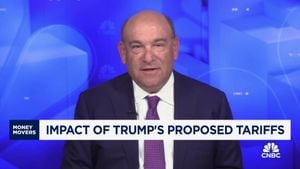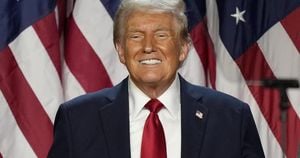Donald Trump is poised for another shake-up of climate policy as he prepares to assume the presidency for the second time. Known for his controversial stance on climate change, Trump has previously denounced the climate crisis as a “scam,” expressing skepticism about its validity and questioning the motivations behind environmental regulations. With his recent election victory, analysts speculate he will follow through on his promise to withdraw the United States from the Paris Agreement once again, echoing actions taken during his first term.
Many experts are now analyzing the potential global ramifications of Trump’s anticipated climate policy shift, particularly concerning China’s strategic advantage. Herbert Crowther, from the Eurasia Group, suggests, "A second US withdrawal from the Paris Agreement would present significant opportunity for China to expand its leadership role in multilateral climate issues." This assessment highlights the geopolitical dimensions of climate action—or the lack thereof—and what it may mean for U.S.-China relations.
Trump's recent electoral win overshadowed the discussions at the United Nations Climate Change Conference, COP29, currently underway in Baku, Azerbaijan. During his first term, Trump’s decision to abandon the Paris Agreement had already left the U.S. out of global climate dialogues, and his return is likely to spell similar consequences. Meanwhile, Chinese representatives are actively working to position their country as the figurehead of global climate efforts, using Trump’s negativity toward climate regulations to bolster their image as the “responsible” global actor. Lily McElwee from the Center for Strategic and International Studies reported, ‘Beijing is out in force at COP29 calling for the United States under Trump to engage in constructive dialogue.’
The irony lies in China's simultaneous role as the world’s largest polluter and its aggressive investment strategy in renewable technologies. President Xi Jinping has committed to making China carbon neutral by 2060, and for some experts, this presents both a challenge and opportunity for the U.S. China’s push for green technology and its global investments are rapidly reshaping its role on the international stage.
China's aggressive renewable energy policies are also part of its wider geopolitical strategy, particularly as it aims to outpace the U.S. in the clean tech sector. With the International Energy Agency (IEA) predicting China will account for 60% of global renewable energy capacity by 2030, Trump’s planned withdrawal from climate initiatives may inadvertently aid Beijing’s ambitions. Trump’s administration may see renewable energy initiatives as threats to traditional jobs, but China is honing clean energy technologies, which they are poised to sell worldwide.
Daniel Araya from the Brookings Institution emphasizes, "Where the Trump administration sees renewable energy as a threat to jobs, China is leveraging clean energy as part of its long-term strategic gambit." Such contrasting views on the potential of green technology indicate how different nations plan to approach both economic recovery and climate crisis management.
The outgoing Biden administration had made significant strides with initiatives like the Inflation Reduction Act, which directed substantial investment toward clean energy. Trump’s pledge to reverse such policies raises questions about the fate of this legislative progress. While many fear the immediate ramifications of the Trump administration’s policies, some argue there is potential for state and city leaders to take the helm in climate leadership.
At the Baku conference, several Democratic governors and local leaders are stepping forward to advocate for climate action irrespective of federal direction. Washington Governor Jay Inslee emphasized the importance of local initiatives, stating, “Progress on climate doesn’t just have to come at the national level.” Trump’s tendency to disregard international cooperation on climate matters opens the door for these subnational leaders to fill the void and pursue policies aligned with global climate goals.
While experts express caution about the long-term consequences of Trump’s anticipated policies, there are indicators of continued bipartisan support for clean energy initiatives. U.S. special envoy for climate John Podesta recently pointed out the broad support for clean energy jobs across party lines. “Fifty-seven percent of the new clean energy jobs created since the Inflation Reduction Act passed are located in Congressional districts represented by Republicans,” he stated during discussions at COP29.
Some within the Republican Party are also urging their leadership to retain at least some elements of the Inflation Reduction Act to avoid losing out on economic opportunities associated with clean energy development. A letter signed by eighteen House Republicans articulated the risks involved with full repeal of the IRA, emphasizing the need to protect job creation and investment returns from taxpayer money.
Conversely, should Trump maintain his commitment to roll back progressive climate policies, the global scene could witness China stepping up its influence, filling the power vacuum left by U.S. retreat. Analysts note, the absence of U.S. leadership invites China to strengthen its position, and many countries may find themselves increasingly reliant on Chinese technologies and investments to meet their energy needs.
Overall, Trump's newly-reclaimed position as president could lead to unprecedented changes not only for U.S. climate policy but for international responses to the climate crisis as well. What this means for the future of effective global action against climate change remains uncertain, but the reactions of countries like China already signal significant shifts may be imminent.
The complexity surrounding international climate dynamics highlights the importance of observing both the aspirations of individual nations and the cooperative efforts at multilateral levels. Whether Trump will significantly alter the current climate discourse remains to be seen, but as he takes office, both allies and adversaries are watching closely.



